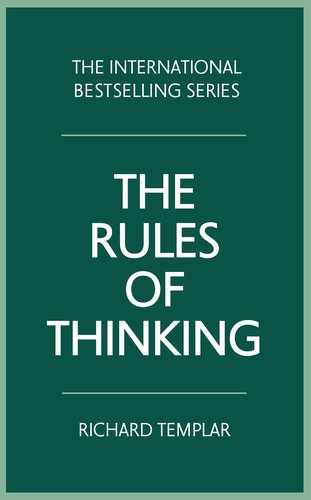Thoughts and feelings are not the same thing, and you don’t have to be able to rationalise your feelings in order to justify them. It’s perfectly fine to feel angry or sad or frustrated or depressed without having to be able to explain why. Feelings are always OK, because they just are. What you do with them might not always be acceptable – the fact you feel frustrated doesn’t justify rudeness – but the frustration just is what it is. People who say, ‘Don’t feel like that, it doesn’t make sense’ are making no sense themselves. I’ve heard comments like, ‘Calm down, there’s no need to be angry …’ but anger isn’t driven by logical need. It’s a thing that just happens sometimes.
Nevertheless, while no one should expect you to justify your feelings, actually it’s in your own interests to be able to understand them. It’s not compulsory, it’s just helpful. If you can think rationally about your feelings while you’re feeling them, you’re much better placed to find ways to ameliorate the ones you don’t enjoy having.
The first step is to work out what you’re feeling. By which I mean give it a name. No, not Eric or Bubbles. Think about which word best describes it. Try to be as specific as you can – don’t just stick with happy or sad. Are you frustrated, or disappointed? Is it fear, or anxiety? Are you grumpy, or irritated? This not only identifies the feeling, it also gives you that sense of detachment from your feelings that mindfulness can, that enables you to separate your deeper self from the temporary emotions you’re experiencing.
Now you understand what you’re feeling, can you think through why you’re feeling it? I mean the real reason, which isn’t necessarily obvious. For example you might be annoyed with your friend for turning down your suggestion of an evening out, but it could be the sense of rejection that has really upset you, not simply missing out on a trip to the pub or the movies. Or not – I don’t know, but you might if you think it through.
Making sense of your feelings like this can help to calm them. It’s not about having any expectation of them – they’re feelings and they’ll do what they like – but thinking them through at least distracts you and tends to give them some perspective. You’re also likely to notice if you’re particularly prone to certain emotions. Do you often notice that you’re feeling disappointed, for example? Or pessimistic? Or regretful?
Now that’s useful information. If you have a tendency to feel disappointed, that suggests to your rational, thinking mind that your expectations tend to be too high. After all, disappointment is about failing to meet your expectations. So now you can actually work on being more realistic in what you expect from people, or from situations, or from whatever it is you’ve noticed tends to disappoint you.
Another benefit of separating your thoughts from your feelings is that you’re more likely to wait until the worst of the feeling is over before you do anything about it. Feelings may not be rational, but actions can be thought through. And your thoughts can take control of whether you fire off an angry email, or shout at your mother down the phone, or spend the evening at home sulking when you could go out and have fun.
IT’S NOT COMPULSORY, IT’S JUST HELPFUL
